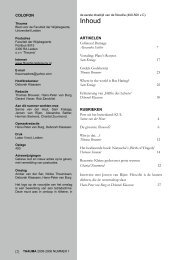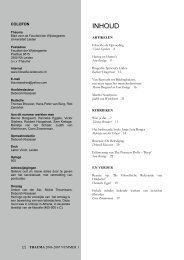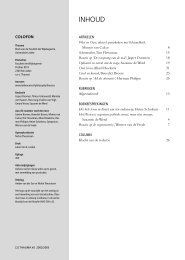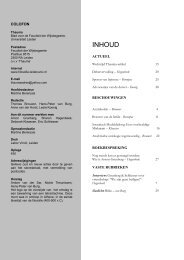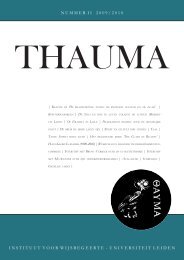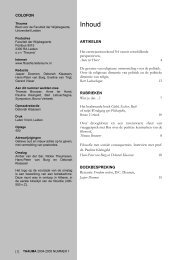You also want an ePaper? Increase the reach of your titles
YUMPU automatically turns print PDFs into web optimized ePapers that Google loves.
“Philosophy is not science’s under-labourer” / Nikola Andonovski<br />
mutability, that combination of solidity<br />
and shifting sand, so typical of human<br />
experience when we look at it up close.” 4<br />
This is as succinct an encapsulation of the<br />
correlationist credo as one could wish for. I<br />
confess I fail to see what is philosophically<br />
challenging about it. Certainly, it challenges<br />
Cartesian dualism, but is this really still<br />
the hallmark of contemporary philosophical<br />
radicality? The enactivist critique of<br />
representationalism is too easily co-opted<br />
by the brand of tubthumping anti-dualism<br />
whose affinities with new-age spiritualism<br />
have been rightly denounced by Zizek<br />
and others. I don’t find it coincidental<br />
that a philosophical ideology that<br />
places such a metaphysical premium<br />
on embodiment and affect should<br />
arise precisely at that juncture where the<br />
full spectrum dominance of neoliberal<br />
capitalism has successfully extirpated the<br />
ideals of rationalist universalism both in<br />
theory and in practice. A metaphysics of<br />
embodied affect is a retreat rather than<br />
an advance from the impasses of subjectobject<br />
dualism. I think the challenge now<br />
is to re-conceive the theory and practice<br />
of rationalist universalism in postcomputational<br />
(i.e. non-anthropological)<br />
terms. Inferentialism provides some<br />
of the resources required to do just<br />
this. It preserves the normative kernel<br />
of rationalism, while discarding its<br />
metaphysical shell. This is to say that<br />
Sellars and Brandom retain Hegel’s<br />
insight into the historicity of reason,<br />
while jettisoning the neo-Aristotelian<br />
substantialization of mind which mired<br />
orthodox Hegelianism in theology.<br />
So in answer to your question: my<br />
adherence to methodological naturalism<br />
commits me to discriminating between<br />
epistemically perspicuous accounts of the<br />
structural links between phenomenology<br />
and folk theorizing, as exemplified<br />
by Metzinger’s self-model theory of<br />
subjectivity, or Pascal Boyer’s work on folk<br />
metaphysics, and the metaphysical inflation<br />
of phenomenological experience that leads<br />
philosophers like Maturana, Varela, and<br />
Thompson to promote a kind of new-age<br />
Protagoreanism.<br />
In the humanities, it has almost become a<br />
cliché to lament the three big blows to the<br />
“primary narcissism” of man: Copernicus,<br />
Darwin and Freud. But, you have been<br />
a staunch defender of the traumatic<br />
disenchantment of the world. In Nihil<br />
Unbound you propose a view that can<br />
perhaps best be captured by the slogan<br />
“the primacy of the theoretical”. You write:<br />
“Nihilism is not an existential quandary<br />
but a speculative opportunity. Thinking has<br />
interests that do not coincide with those<br />
of living” 5. Why exactly does nihilism carry<br />
this liberating potential?<br />
Because it’s not possible to carry on making<br />
sense of ourselves or the world in the way<br />
we have been for the past two and half<br />
thousand years. Or rather, it’s no longer<br />
possible to do so in good intellectual<br />
conscience. Of course, one can always<br />
silence the latter by abandoning reason<br />
and truth in name of sensation and life.<br />
I’ve tried to show why the attempt to do<br />
so generates incoherences that stymie<br />
philosophical thought altogether. But even<br />
for those who are unwilling to forego truth<br />
in the name of life, the question is whether<br />
philosophy is to be mere nostalgia for some<br />
supposedly prelapsarian harmony between<br />
man and world, or whether on the contrary<br />
it should reassert its originary kinship<br />
with the sciences and strive to push our<br />
cognitive capacities to their limits in order<br />
to test the grip of our organic equilibrium.<br />
Obviously, this assumes that thought can be<br />
compelled by interests that transcend those<br />
of the organism, and this is of course an<br />
idealist—ultimately Platonist—trope, which<br />
I not only admit but embrace, since I hold,<br />
along with Plato and Hegel, that<br />
the compulsion of the concept<br />
allows reason to incorporate<br />
death. But Nihil Unbound<br />
only skims the surface of<br />
the underlying issue: if<br />
one believes, as I do, that<br />
the imperative to think is<br />
compelled by irrecusable<br />
rational obligations,<br />
then the acknowledgment<br />
that the validity of the<br />
categories of sense that have<br />
been available to us for two<br />
millennia have now lapsed irrevocably,<br />
carries with it the injunction to transform<br />
the structure of sense. However, I now<br />
realize the issue is more dialectical than<br />
I thought in Nihil Unbound, because the<br />
boundary between sense and senselessness<br />
is historically determined and the formal<br />
structure of sense allows for a fundamental<br />
reconfiguration in what can and cannot<br />
be meaningfully experienced. What is<br />
conspicuously absent from Nihil Unbound,<br />
but what I am currently trying to elaborate,<br />
is an account of the generative status of<br />
the negative that would not lapse back<br />
into some sort of dubious emanationism.<br />
The problem consists in articulating the<br />
relation between the dialectical structure<br />
of conceptual discourse and the nondialectical<br />
status of the real, in such a<br />
School / 9<br />
as to explain how real negativity fuels<br />
dialectics even as it prevents dialectics<br />
from incorporating its own negativity. Real<br />
negativity splits the logos from within,<br />
while from without it splits signification<br />
from reality. The goal is to understand<br />
how non-conceptual negativity determines<br />
dialectical negation, while preventing<br />
negation in the concept from fusing with<br />
real negativity.<br />
You end Nihil Unbound with<br />
an emphatic portrayal of<br />
philosophy as an “organon<br />
of extinction”. The “will<br />
to know”, marked by the<br />
trauma of extinction is,<br />
via philosophy, rendered<br />
commensurate with<br />
the objective reality of<br />
extinction. But, does this sort<br />
of position not simply echo the<br />
Heideggerian pathos of finitude?<br />
Aren’t you proposing here a form of<br />
authenticity of the disappearing self - an<br />
ethics of nihilism, perhaps?<br />
Yes and no. Yes, if by ‘authenticity’ one<br />
understands the rationalist imperative<br />
to transform the structure of sense<br />
in accordance with the norm of truth,<br />
according to an impersonal ideal of<br />
collective cognitive authenticity that would<br />
be Hegelian rather than Heideggerian.<br />
No, if ‘authenticity’ is understood in a<br />
personal-existential register in terms of<br />
the ontological propriety of the individual<br />
self. Extinction is not just the cosmological<br />
transcoding of Heideggerian finitude, but<br />
its speculative sublation in the form of a<br />
new synthesis of thought and object, or<br />
subject and death—a dead subject. This



